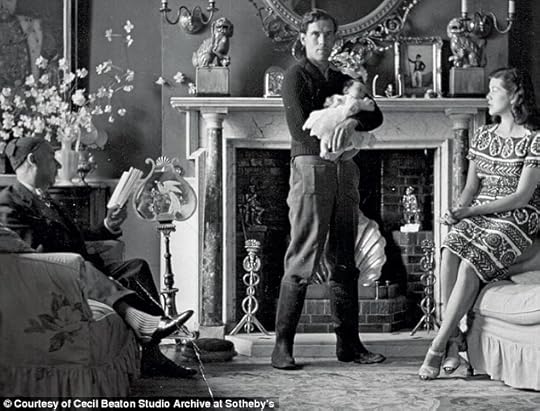Colleen Mondor's Blog
March 16, 2015
Assessing February on the Resolution Scale

We're through February so here's a belated look at how I did keeping my work resolutions for the year.
1. Reviewed two books for Booklist, one on the Iraq War and one on how income inequality in the U.S. affects children. This was a slower month but after January (where I reviewed 8), it was welcome.
2. No books read for Locus, but did submit the list for the next several months, made several requests and received a couple of books.
3. Six articles in the Bush Pilot blog including one on winter survival that generated some angry comments but is something I'm rather proud of.
4. The essay I submitted was rejected with a form letter response. I think there is another way to write it that would improve it and I think I got too personal. I'm not crushed by this rejection at all; mostly I'm just happy that I wrote it and submitted it all in one month.
5. I wrote a piece on a science series for teens that I've been trying to place. I sent out some queries to lit sites that have gotten me nowhere (I wrote about this last week), so now I'm trying to send it out to science sites which might end up being a much better fit anyway.
6. Conducted a couple of interviews I needed to do for some Alaska work and sent out a list of questions for some other pieces I have planned. All of that is in the works this month.
7. Did a ton of research on places to submit too. In a lot of ways this is the toughest part of writing (maybe even harder than writing itself). Now I know what I'm writing and where I'm sending out to (first try, second try, third try), which makes me feel like I'm in a lot more control of my writing life.
February was okay for me. I didn't make a big strides forward, but didn't fall back either. One lapse was my failure to get the Alaskan profile done that I planned to write. I don't know how I failed on that one. March has been better - I'm only halfway through but I think it's going to be a more successful month for me which is important.
Now, I just need to get my photo albums back on track......
March 10, 2015
Literary web sites, YA books & snobbery
While attending a large literary conference last year I approached a table for a popular lit site* and asked to speak with someone about submitting reviews. I was pointed in the direction of a nearby friendly editor who I introduced myself to and explained that I was a reviewer for Booklist and also the longtime YA columnist for Bookslut. "I would like to submit a review of some YA books with crossover appeal to your site," I explained, "and wondered if there was a specific person to whom I should direct my email."
"Oh, we don't run any teen book reviews," she replied. "Our readers aren't interested in those books. You can always submit to our general site email though and take a chance. Thanks for stopping by!"
And then she turned her back and starting speaking to someone else and I realized I was having one of those moments where someone dismisses you in a way that is acceptably rude but certainly feels lousy.
In the months after that interaction, I spent some time looking for lit sites that might be open to new YA submissions. I was picked up by LARB for a piece last fall and am now doing regular reviews for Locus (in print). Last month I finished a piece I've been wanting to write for a while about a YA series of NF science books though and emailed a query letter to another big lit site. The response was very polite, the editor was actually interested in the books for his kids, but again I was told that their readers are not interested in "these kinds of books". And that's when I got serious about seeing just what kind of books lit sites are reviewing.
There have been a zillion articles written about whether or not adults read YA; enough of them that I don't need to tackle that subject again. One thing no one does dispute is that people who visit lit sites are book readers and book lovers and while there have been no big surveys about whether or not these folks have children, I think it is safe to assume that a decent sized segment of the reading population are in fact parents and probably inclined to buy books for their kids.
I don't think I'm going far out on a limb when I suggest that perhaps these parents might want to know about a great book every now and again that might be enjoyed by their kids (or their nieces, nephews, cousins, godchildren or other young people in their lives). The assumption that appears to be widely made by the lit sites however is that their readers would prefer to find those type of book reviews (and the books themselves) elsewhere. I have no idea why they have come to this conclusion.
I suppose some site administrators do survey the specific post stats and can say that a YA book review receives fewer visitors than a comparable adult literary review. But honestly, that kind of analysis doesn't really impress me much as a reader. Stats can be driven by so many strange things (like controversy) and quantity does not necessarily mean quality.
In other words, 1,000 people might blow through a post, not read past the first few paragraphs and never think of the book again while 200 readers might read another post and all go out and buy the book or check it out from the library or mention it on social media. It's really tough to quantify the value of one visitor over another.
None of that is the point though as I don't think that potential stats are what drive the decision for lit sites to pass on YA book reviews. I think it is a lot more about not wanting to be perceived as a teen site or be associated with people who read or want or care about teen books. Lit sites want to be about certain books and the people who they think read those and all the rest, well, those are books for other kinds of readers.
Yeah, this is that dismissive part again.
While I am not a fan of casting a derisive eye on genre reading either, (I love a good fantasy, mystery or romance as much as anyone), the refusal to include at least occasional YA book reviews seems particularly shortsighted to me. It smacks of superiority, of more of that "serious readers vs everybody else" attitude that seems to lurk at the corners of far too many online literary conversations. It's like standing in a room with people who claim they were reading Dostoyevsky at age 12 as opposed to the likes of Harry Potter.
I never believe those people. (And honestly if it's true, it's deeply strange.)
The other day my 13 year old son finished reading the two Lockwood & Co. books by Jonathan Stroud and raved about them, insisting I give them a shot. I read both books, enjoyed the heck out of them, (great characters, wonderful world building, just the right dose of creepy mystery), and promptly emailed a cousin to suggest them for his son. I also made a note to buy them for my niece in a couple of years (she's a little young) and will be mentioning them to a sister-in-law for my nephew to read.
My son accomplished with his review exactly what lit sites are supposed to be about--to share good books with as many potential readers as possible. I'm not sure that most literary sites believe that anymore or rather, that they have narrowed their definitions of potential readers to a size that makes it too small for general readers (and book buyers) like me to feel welcome.
I'm going to send some queries out to a few science sites for the piece I have on those YA nonfiction books. I'm hoping it will have a better reception there.
*Nope, I'm not going to name names because then this becomes a big me vs them post and I just don't have the energy for that level of online dramarama right now.
March 9, 2015
Half a Man by Michael Morpurgo
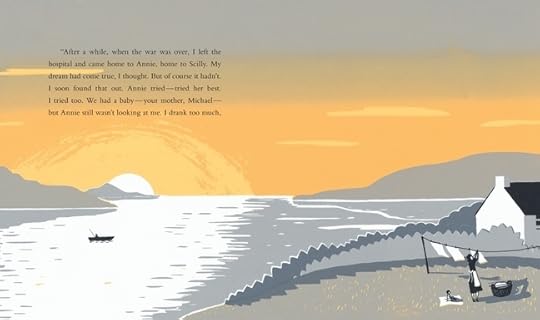
Half a Man is a small square illustrated book with limited text that has been published for middle grade readers. It tells the story, from young Michael's perspective, of his relationship with his divorced grandfather who was badly burned when his merchant ship was torpedoed during WWII.
While growing up, visits were stilted and uncomfortable and full of nervousness that he might stare at his grandfather's scars, after being told repeatedly by his mother that he must not. The two slowly began to connect only when Michael was sent alone to spend part of his summer holiday with his grandfather (who lived on the distant Scilly Isles) It is only after high school that Michael finally hear the story of what happened during the war and in the years afterwards when his grandparents split up. It is all as tragic as readers might expect and made all the more so by how everything went sadly wrong when the survivor, so horribly scarred, both physically and emotionally, returned home.
I read the book in minutes--there's not much to it after all--and was struck both by the gorgeous and scorching honesty of Morpurgo's story and the truly lovely accompanying illustrations by Gemma O'Callaghan. It's all such an elegant package and I really really love it but....I don't for a second think this is a book for kids 8-12 years-old.
It is not that the subject matter is too intense; kids read about horrible things all the time and there is nothing portrayed in a graphic manner (either through words or images) in Half a Man. But what the book is really about--compassion, empathy, becoming a man and sharing emotional honesty with those you love--well, I can't help but think it is all too much for the average tween. Are there some who will get it? Yes, yes, I'm sure they are out there. But this is a book that I believe requires the reader have more life experience then most middle graders bring to the table. I just don't think they have lived enough to get what Murpurgo is sharing and while Half a Man might not appear to be the sort of book that teens (and adults) should be reading I think they are the ones who will appreciate it the most.
(I have a very smart 9 year-old niece and I am 100% certain she would read this book, tell me it was sad and then move on without a backward glance after turning the last page. It's too much to expect her to get this one right now and a waste of time to try.)
Half a Man is an amazing book and I hope that it finds readers who will appreciate every single word.
[Interior spread via Candlewick Press.]
February 26, 2015
The book you write when you find out your great great grandmother is a ghost
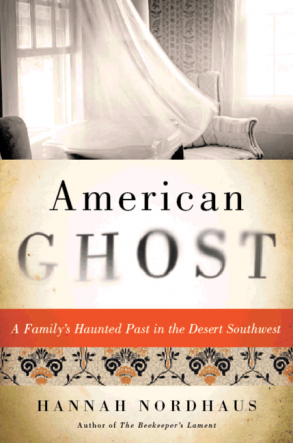 Now this is a book on family history you don't find to often! Hannah Nordhaus has roots that go far back in New Mexico history and her great great grandparents owned one of the finer homes in Santa Fe. Now a hotel (and out of the family's hands), the hotel has been famously haunted for decades supposedly by Nordhaus's gg grandmother, Julia Schuster Staab who died in 1896. American Ghost is the story of how the author went looking for Julia, both her ghost and her truth.
Now this is a book on family history you don't find to often! Hannah Nordhaus has roots that go far back in New Mexico history and her great great grandparents owned one of the finer homes in Santa Fe. Now a hotel (and out of the family's hands), the hotel has been famously haunted for decades supposedly by Nordhaus's gg grandmother, Julia Schuster Staab who died in 1896. American Ghost is the story of how the author went looking for Julia, both her ghost and her truth.
German Jews who relocate to Santa Fe is a pretty interesting family history without much added to it, but Nordhaus finds out a lot more as she looks for the reasons why Julia left Germany. Because the Staab family was so prominent in New Mexico history, newspaper coverage is abundant and there are also letters, diary entries and some personal histories along with general records that Nordhaus is able to mine for information. She also goes in a different direction as well and tries to communicate with Julia's ghost.
At first, the "ghostbusting" chapters seemed odd to me, like the author was padding the narrative. But slowly she makes it clear that her attempts to reach out to the ghost, (and find out of there even is a ghost), are also a bit about finding herself or perhaps finding how she feels about her ancestors. These chapters also provide a bit humor which is welcome as Julia's life has some truly tragic downturns and, as expected, not all of the family left Germany so there is some enormous sadness found there.
I have read several books about finding your family but this is the first one where a family member is a famous ghost which is really fairly outrageous when you think about it. I will admit I am envious of Nordhaus however--she has so much family history to fall back on, such a solid place to start from and I have only the tiniest shreds in comparison. But that envy did not reduce my ability to enjoy American Ghost a lot or glean some tips from her search.
February 23, 2015
The Eterna Files
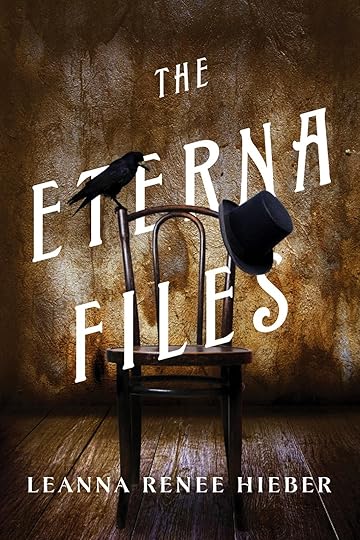 Leanna Renee Hieber is an author who I find both wildly appealing and sometimes frustrating. I read and enjoyed very much one of her previous series which began with The Strangely Beautiful Tale of Miss Percy Parker. Her gaslamp fantasies excel at world building and have beguiling characters placed in intriguing and challenging situations. Sometimes though, I feel overwhelmed by so many people and so many things going on. It's not that the plots are dense but rather somewhat frenetic. This is not a bad thing but can be exasperating (at least for me). But it doesn't keep me from going back for more from Hieber and so I was quite pleased to dive into her latest book, The Eterna Files.
Leanna Renee Hieber is an author who I find both wildly appealing and sometimes frustrating. I read and enjoyed very much one of her previous series which began with The Strangely Beautiful Tale of Miss Percy Parker. Her gaslamp fantasies excel at world building and have beguiling characters placed in intriguing and challenging situations. Sometimes though, I feel overwhelmed by so many people and so many things going on. It's not that the plots are dense but rather somewhat frenetic. This is not a bad thing but can be exasperating (at least for me). But it doesn't keep me from going back for more from Hieber and so I was quite pleased to dive into her latest book, The Eterna Files.
In the wake of President Lincoln's assassination, Clara Templeton sets in motion events to find the secret to immortality. Flash forward 17 years and the American team pursuing this goal is mysteriously (almost magically) killed. Clara seeks to find out what happened but soon finds herself in a race against the British who are looking for their own answers as their competing team has also been killed.
Hieber splits the narrative primarily between Clara in New York City. and Harold Spire and Rose Everhart in London. Each side with their own trusted Scooby squads, they follow clues and try to find out what happened, all the while suspecting each other of the nefarious deeds. Of course (of course!!) there is more to it than that, but I'm sure Hieber will bring the groups together in the next installment and hopefully they will join forces sooner rather than later.
All the characters are good, especially Clara and Rose, who are smart and talented on their own while also realistically dealing with the gender politics of the day. Everyone else is quirky as all get out which makes sense as Hieber excels at quirky. There's all kinds of paranormal bits going on from mediums and clairvoyants to Voodoo. There are also class differences, a few jerks and some PTSD from lots of childhood trauma. So far, no romance but hints of some to come which would fit well in the layers of this mystery/thriller/drama.
So yeah, The Eterna Files is off to a bang-up start and shows Hieber doing what she does best yet again. I'll be back for the sequel; I just can't manage to stay away.
"An aristocratic family, a high-society scandal and an extraordinary legacy"
Because I continue to have an unquenchable attraction to big sweeping biographies of dysfunctional British families (I have no idea where this came from), I was delighted to have The Mad Boy, Lord Berners, My Grandmother and Me by Sofka Zinovieff arrive at my door. (How in the heck Harper Collins knew I would want this book I will never know.)
Set in the period between the wars and forward (although there is some discussion of WWI as well), The Mad Boy tells the story of Lord Berners, one of those spectacularly unusual Brits (they dyed the birds at his estate in pastels as decorations!!!!) of a certain era who happened to be gay and fell hard for Robert Heber-Percy, a younger aristocrat who liked both men and women, lived life in a crazy near-suicidal way and was really really good looking.
And then there's Jennifer, who married Robert, promplty had his child and all of them lived (for a time*) at Berner's estate. Together. While all of English society wondered what the heck was going on.
It's not as salacious as you think (no wild orgies!) but more complicated and full of parties and marriages and divorces and things suspected but left unsaid and parties. LOTS OF PARTIES.
Here's what gets me about England and why I find so many aspects of its society so unbelievable:
The rules of primogeniture has kept together the huge fortunes of English lords; it has also formed the class system. It is the great distinction between the English aristocracy and any other; whereas abroad every member of a noble family is noble, in England non is except the head of the family. The sons and daughters may enjoy courtesy titles but as a rule the younger offspring of even the richest lords receive comparatively little money. Younger sons have thus habitually been left without money, property or title, often without the skills to acquire them and, above all, without belonging to the place they care most about. As clergymen, soldiers, sailors and resentful ne'er-do-wells, these high-born outcasts litter the pages of nineteenth-century English novels, with their hopeless attempts to make a way in the unfriendly world and their irresponsible sprees of adventuring.
So, while the The Mad Boy is a lot about people of the upper class having a certain life before WW2 and that how much that changed after WW2, it's also about a lot of people who weren't the first-born sons who were cast out of the lives they had known, the homes the loved and the lifestyles they were born to enjoy. It's.....well, it's crazy. You literally can never go home again and yet you also aren't supposed to (or prepared to) go get a job somewhere either.
Plus, you had parties with dyed birds because that kind of thing is just what you do!!
Zinovieff has done an enormous amount of research for this book and for all that there are a zillion names dropped, (visitors included all the Mitfords, Cecil Beaton, Gertrude Stein, Igor Stravinsky, Salvador Dalí and on and on), she keeps it well organized and easily sucks you in. (The pictures are stunning!!!) Consider it a guilty pleasure maybe, but a real eye-opener as well.
*Shockingly, the marriage did not last but Jennifer went on to marry Alex Ross and then live for a while in a cult before she really settled down.
For more see The Guardian review.
[Photo from the book cover, taken by Cecil Beaton. L-R, Lord Berners, Robert Heber-Percy holding daughter Victoria, wife Jennifer on right.]
February 19, 2015
Ships on ice

From Gizmodo:
Three U.S. Navy icebreakers pushing an iceberg out to sea to clear a channel leading to McMurdo Station, Antarctica, 29th December 1965. The ships are, left to right: the USS Burton, USS Atka and USS Glacier.
I am endlessly fascinated by ships and ice - no idea why but it explains why I loved that Polar Literature course in college so much. (Follow the link for more wicked cool pics!)
February 17, 2015
My great great aunt Ernestine and her secret British husband
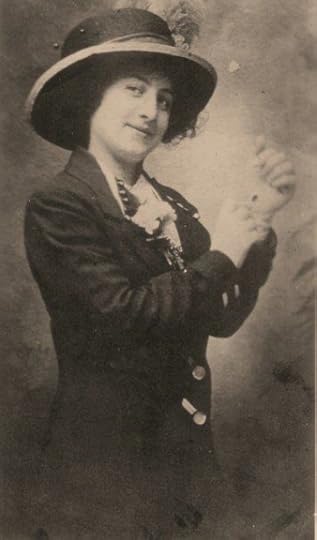 Of my great grandmother Julia's three younger half sisters, Ernestine seemed to be the least mysterious. She was born in NYC in 1895, eventually married a man named "Mac" MacLeod and moved to Santa Barbara where they bought and ran a motel. I knew they were in California in the early 1930s as my great uncle Robie made a rather crazy motorcycle trip cross country then to visit them in a story I heard many many times. We have a few pics from that trip. And my mom remembered visiting the MacLeods in the 1950s, and we also have pictures of that.
Of my great grandmother Julia's three younger half sisters, Ernestine seemed to be the least mysterious. She was born in NYC in 1895, eventually married a man named "Mac" MacLeod and moved to Santa Barbara where they bought and ran a motel. I knew they were in California in the early 1930s as my great uncle Robie made a rather crazy motorcycle trip cross country then to visit them in a story I heard many many times. We have a few pics from that trip. And my mom remembered visiting the MacLeods in the 1950s, and we also have pictures of that.
Aunt Tina and Uncle Mac did not have children and I knew she passed away, after him, in the late 1990s. My genealogy goals were thus pretty small: get the marriage certificate for them, get death certificates and likely just move on. Nothing to see here, right?*
The biggest problem with Tina is that I don't know Mac's first name. Obviously, he went by a nickname derived from MacLeod, so that's a bit of a puzzle. But I figured Ernestine Pressl (her maiden name) was odd enough that a marriage certificate shouldn't be too difficult. So I set them up at ancestry.com, did a search and there you go, a 1915 marriage certificate in NYC for Ernestine Pressl.
And William A. Wilson of London.
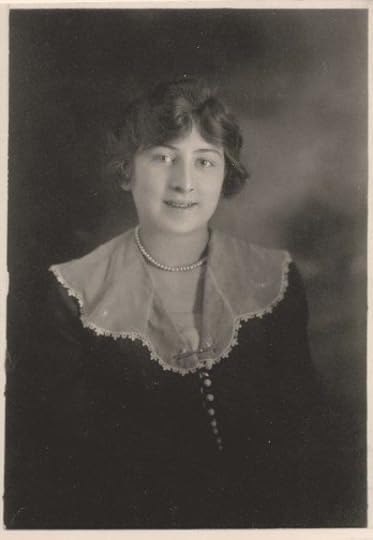 I paid to get a copy because I had to know if this was our Aunt Tina. How many Ernestine Pressls can there be after all? So after a few weeks it showed up and there she was, with the correct names for her parents (Marie Filak and Rudolph Pressl) and there was lovely William A., born in 1889, with his parents Pattie Clark and Arthur Wilson. It was a first marriage for both of them and took place in the same church as Tina's parents. This was definitely my family, I just didn't know a thing about what I was looking at.
I paid to get a copy because I had to know if this was our Aunt Tina. How many Ernestine Pressls can there be after all? So after a few weeks it showed up and there she was, with the correct names for her parents (Marie Filak and Rudolph Pressl) and there was lovely William A., born in 1889, with his parents Pattie Clark and Arthur Wilson. It was a first marriage for both of them and took place in the same church as Tina's parents. This was definitely my family, I just didn't know a thing about what I was looking at.
First, I told my mother and she spent some time being shocked. ("No, Aunt Tina's husband was Uncle Mac. I met Uncle Mac, I remember Uncle Mac. Who in the world is William A. Wilson?")
Then I looked for a marriage between Ernestine Wilson (as that was her name for the 2nd marriage) and a MacLeod which came up with nothing. No idea what happened there. I'm thinking I'll have to spring for an international search as I've heard from family that Mac might have been Canadian. Maybe they went up there to get married? And beyond that, what happened to William? I looked in the records for British WWI deaths and there are, no surprise, more than a dozen William Wilsons. I'll have to find a way to search through those and see if my William is one of them (with a widow named Ernestine and middle name "A" which I bet is for Arthur). (How hard could it be to find him, right?!)
In the meantime I am looking at these pictures of Tina, taken around 1915, and wondering why on earth this had to be such a secret. There was never a mention of Tina as a widow, or divorced or with a man other than Mac. I can't help but think he disappeared from the family history simply because he was little known to all them. He was there and then he was gone and I guess didn't make enough of an impression.
Poor William A. Wilson; he didn't even rate a mention let alone a memory. And poor Aunt Tina, whose story, though a bit sadder, has just gotten a heckuva lot much more interesting.
[Post pic of Ernestines around 1910-1915. She was born in 1895, I figure she is in her late teens in these.]
*When am I going to learn to stop thinking that way? (Rhetorical question - genealogists never expect the kind of surprises that seem to be coming my way left and right lately.)
February 13, 2015
Isabel's War by Lila Perl
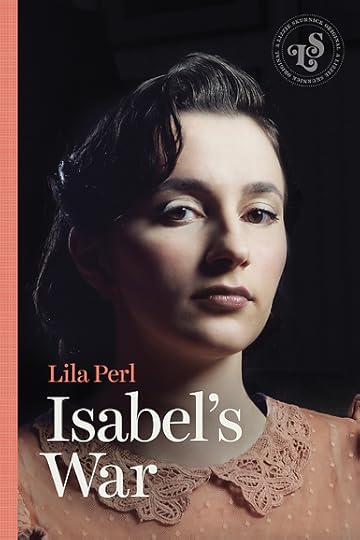 I approached Isabel's War with a bit of trepidation--it's a WW2 novel with heavy mention of the Holocaust (although set in the US) and I feel like way too many books have been published over the years that use the pain of that war to gain easy sympathy. (You know who I'm talking about.)
I approached Isabel's War with a bit of trepidation--it's a WW2 novel with heavy mention of the Holocaust (although set in the US) and I feel like way too many books have been published over the years that use the pain of that war to gain easy sympathy. (You know who I'm talking about.)
Isabel's War is something different however, it opens in a summer vacation hotel ala Dirty Dancing for one, and the title character is a twelve-year old American with a healthy chip on her shoulder and an awareness of her own shortcomings that is quite refreshing.
(Her mother is also the world's most critical women, but Isabel can deal with her.)
Isabel meets teenage Helga, the newly arrived German niece of her mother's good friend, while at Shady Pines. The girls are quickly thrown together as adults will do to kids, ("I'm sure you girls will get along just fine!"), and though they have little in common, a small friendship begins to develop. Soon enough though Isabel's family is thrown in to turmoil, and must return home, when her older brother enlists. She doesn't expect to see Helga anytime soon but then the family friend becomes ill, Helga needs a place to stay for awhile and just like that the girls are practically 24/7 together.
One of the things Perl did so well with this novel is let Isabel and Helgo become friends slowly. There's no rush to BFF-dom here and the fits and starts in their relationship make both girls easier to relate to. Two other great characters are Isabel's friend Sibby and her mother who are heavily involved in the news of the war (Sibby's father is a merchant marine). They force Isabel to become more engaged and it is through their influence that she begins to ask Helga smart questions about her past and finally uncovers just how she came to America.
There's some very good history in Isabel's War, especially about the Kindertransport which is rarely covered in teen history or literature. It's also nice to see how Sibby's mother learns about the horrors Jewish people faced in Europe--she makes a point of telling Isabel that you have to read the small parts of the newspaper on the back pages to get the whole truth. As this was how news of the Holocaust slowly came to the world, it's a nice touch that Perl has it explained that way in the text.
There's a bit of Nancy Drew appeal to Isabel's War; all of Helga's secrets get revealed and Isabel is relentless to get to the truth. There is also some self-righteous fury here aimed at willfully ignorant adults and some expected coming-of-age angst. It's all good and I enjoyed this novel a lot.
February 9, 2015
The Stonehenge Letters by Harry Karlinsky
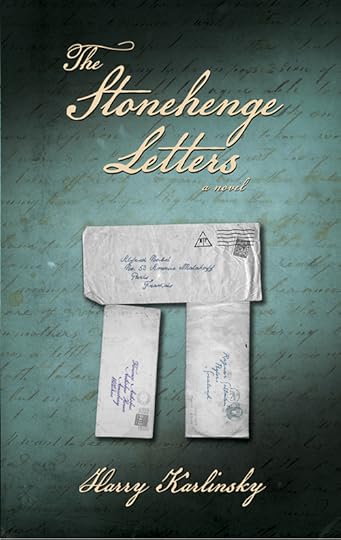 The title of The Stonehenge Letters immediately caught my eye for reasons obvious to any history lover. The description though was the real seller - a novel about a researcher who discovers a cache of letters in the Nobel Prize "crackpot" file that are all written by Nobel winners, (Marie Curie, TR Roosevelt, Rudyard Kipling and Ivan Pavlov), and all seek to solve the mystery of Stonehenge. The narrator, who previously was occupied with trying to determine why Sigmund Freud was not awarded a Nobel, then changes course and seeks to discover what Nobel's connection was to Stonehenge. That historical mystery (which actually is true) along with the letters and why their authors were interested in writing them (all of which is fiction) makes up the plot of this diverting and smart novel.
The title of The Stonehenge Letters immediately caught my eye for reasons obvious to any history lover. The description though was the real seller - a novel about a researcher who discovers a cache of letters in the Nobel Prize "crackpot" file that are all written by Nobel winners, (Marie Curie, TR Roosevelt, Rudyard Kipling and Ivan Pavlov), and all seek to solve the mystery of Stonehenge. The narrator, who previously was occupied with trying to determine why Sigmund Freud was not awarded a Nobel, then changes course and seeks to discover what Nobel's connection was to Stonehenge. That historical mystery (which actually is true) along with the letters and why their authors were interested in writing them (all of which is fiction) makes up the plot of this diverting and smart novel.
Much of The Stonehenge Letters is straight up nonfiction and previously published in many other places, from Nobel's childhood, the conflicted relationship with his family (one of his brothers was blown up in an accident) and his romantic affairs. Karlinsky does a nice job of providing brief biographies of the major players at the end as well as a bit of his own historical research. Personally, I never knew that Stonehenge was privately owned (or for how long) and found that very interesting. (Nothing like being told by the government you own something crucial to the nation and thus can't sell it but you are responsible for its upkeep, protecting it from the public and the public from it and the government won't help you in any way financially.) (Go Britain!)
I loved the diversionary aspect of this novel, it's dips into and out of history, (the photos are fantastic!) and the cheekiness of the author. The narrator is a rather stuffy person but committed to the truth of his story and the truth here is as wild as you would expect. Roosevelt in particular does not disappoint with his outlandish proposal which includes bonus (!) Robert Peary!
You could believe all of this, it's that well thought out, and personally I loved the fun of believing it for awhile. It's exactly the sort of imaginative pop-culture/history mash-up that I don't think we get enough of in literature. Karlinsky took a chance here with his idea but his execution is perfect. Well done on Coach House Books for publishing such a fun book.

